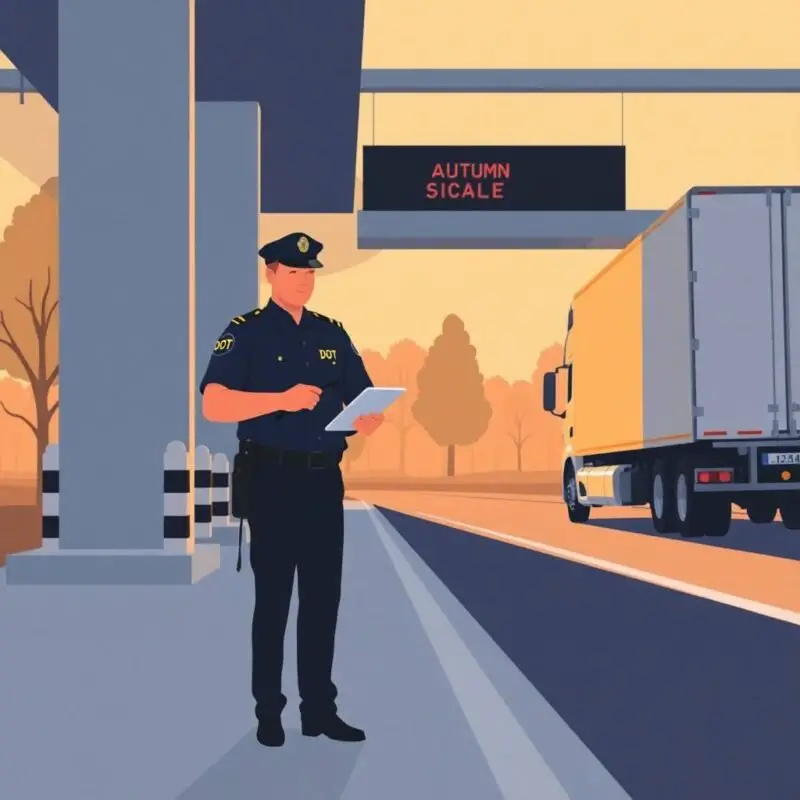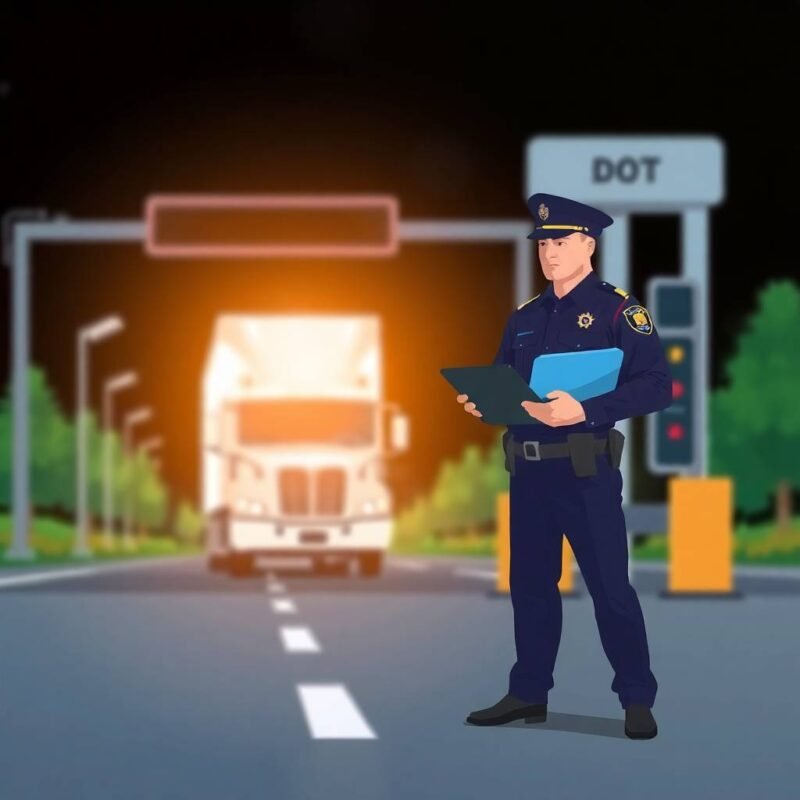1. Understanding ELD Exemptions for Truckers: Who Actually Qualifies?
For many carriers and independent drivers, Understanding ELD Exemptions for Truckers can be the key to avoiding unnecessary equipment costs and streamlining operations. While Electronic Logging Devices (ELDs) are required for most commercial drivers, several categories of truckers may qualify for exemptions under FMCSA guidelines. Knowing whether you fall into one of these categories is crucial for compliance — and peace of mind.
Short-Haul Drivers and the 150 Air-Mile Radius Rule
Understanding ELD Exemptions for Truckers begins with one of the most common exemptions: the short-haul exemption. If you operate within a 150 air-mile radius of your reporting location, return there within 14 hours, and maintain time records, you may not be required to use an ELD. This is especially relevant for smaller fleets or local operators, many of whom also benefit from DOT compliance tools for small fleets.
Pre-2000 Engine Exemption
Trucks with engines manufactured before the year 2000 are also exempt. Since ELDs require ECM connectivity, older engines without this technology are not obligated to install them. However, Understanding ELD Exemptions for Truckers means staying current on all other FMCSA compliance requirements for trucking companies, even if ELD use is not mandatory.
Driveaway-Towaway Operations
Another group that qualifies involves driveaway-towaway operations where the vehicle being driven is the commodity being delivered. In such cases, Understanding ELD Exemptions for Truckers ensures that these unique operations remain compliant without investing in unnecessary ELD systems. These operators still must keep accurate driver logs and meet all other DOT requirements.
Agricultural and Utility Operations
Drivers transporting agricultural commodities within a 150 air-mile radius during harvest or planting seasons may be exempt. Similarly, utility service vehicles responding to outages or emergencies can often operate without ELDs. For both, it’s essential to verify eligibility based on FMCSA’s current hours-of-service exemptions.
Avoid Costly Compliance Mistakes
Even if you’re exempt from ELD use, that doesn’t mean you’re off the hook for DOT audits or other compliance requirements. DOT audit preparation is critical for ensuring your business remains in good standing. Misunderstanding exemptions could result in costly compliance mistakes or penalties.
Documentation Still Matters
Understanding ELD Exemptions for Truckers also involves understanding the importance of documentation. Exempt carriers still need to maintain complete driver qualification files, adhere to drug and alcohol testing rules, and follow the UCR filing deadlines each year.
Need Expert Help? Schedule It Now
If you’re unsure about your exemption status or how to maintain full DOT compliance without an ELD, don’t wait until it’s too late. Schedule a compliance consultation with a trucking compliance expert who can walk you through your obligations, help you avoid red flags in the Safety Measurement System, and ensure you’re aligned with all relevant FMCSA regulations.
Conclusion: Stay Ahead by Staying Informed
Understanding ELD Exemptions for Truckers is about more than saving on equipment — it’s about strategically managing your fleet while remaining 100% compliant. Use the FMCSA portal to verify your current status, and refer to the DOT compliance checklist to ensure every compliance area is covered. With the right knowledge and support, you can keep your operation moving — exempt and empowered.

2. Saving Time and Stress: How ELD Exemptions Simplify Compliance
Understanding ELD Exemptions for Truckers can be a game changer for owner-operators and small fleets navigating the complex world of FMCSA regulations. While ELDs are mandatory for most, several categories of drivers qualify for exemptions that can significantly reduce stress, cut down on administrative tasks, and save valuable time on the road.
Understanding ELD Exemptions for Truckers Saves You Time
One of the clearest benefits of Understanding ELD Exemptions for Truckers is the ability to operate without the hassle of ELD installation, maintenance, and daily use. Drivers who qualify—such as those using vehicles with pre-2000 engines or operating within a 150 air-mile radius—can maintain simpler logs and spend more time focusing on delivery and service.
Even without ELDs, staying compliant is non-negotiable. Resources like the DOT compliance checklist for owner-operators provide essential guidance to ensure your business meets every other FMCSA requirement.
Cut Down on Compliance Headaches
Understanding ELD Exemptions for Truckers is about more than just devices—it’s about streamlining your entire compliance process. By qualifying for exemptions, you reduce exposure to certain FMCSA compliance mistakes and technical errors, making audits and inspections less stressful. But don’t forget: exempt or not, you still need accurate driver qualification files and proper drug and alcohol testing compliance.
Stay Compliant Without the Device
For many small carriers, ELD exemptions offer an opportunity to maintain regulatory compliance without the cost and complexity of electronic logging devices. Understanding ELD Exemptions for Truckers helps you navigate the FMCSA compliance requirements for trucking companies while focusing on alternative compliance measures like keeping up with UCR filing deadlines and maintaining a current DOT safety compliance checklist.
Avoid Trouble During Audits
Even if exempt from ELDs, carriers must be prepared for audits. The DOT audit preparation checklist outlines critical areas you must cover, including HOS compliance, insurance filings, and the FMCSA Clearinghouse. Understanding ELD Exemptions for Truckers can reduce your workload, but thorough preparation is still essential.
What Else Should You Track?
Understanding ELD Exemptions for Truckers doesn’t exempt you from filing biennial updates through the FMCSA portal, maintaining valid insurance filings, or following CDL disqualification rules. If you’re handling hazmat cargo or operate under hours-of-service exemptions, your compliance obligations remain high.
Customized Help Is Just a Click Away
Not sure whether your operation qualifies for an exemption? Schedule a consultation today. Our team will assess your situation, walk you through your obligations, and help you avoid delays or penalties.
Stay Ahead with Expert Support
Understanding ELD Exemptions for Truckers empowers you to simplify your operation without sacrificing safety or compliance. Stay ahead by using tools like the FMCSA Safety Measurement System and ELD device requirements page, and keep your driver logs clean—even when exemptions apply.
Exempt or not, trucking success hinges on proactive planning and expert support. Let us help you make compliance less complicated.

3. Lower Operating Costs: A Hidden Advantage of Going ELD-Free
For many small carriers and independent truckers, navigating the complex world of FMCSA regulations often feels overwhelming. However, Understanding ELD Exemptions for Truckers opens the door to surprising advantages—chief among them, lower operating costs. While most fleets must comply with ELD mandates, those who qualify for exemptions can bypass expensive equipment and subscription fees while still staying compliant with federal regulations.
Understanding ELD Exemptions for Truckers Can Reduce Equipment Costs
One of the most direct savings linked to Understanding ELD Exemptions for Truckers is the elimination of electronic logging device costs. ELDs can cost hundreds of dollars per unit, plus monthly service fees. Owner-operators with qualifying trucks—like those manufactured before the year 2000—or drivers who operate within the 150 air-mile radius short-haul exemption, can legally avoid these costs.
Even without an ELD, staying compliant is critical. Use this DOT compliance checklist for owner-operators to keep your business audit-ready while saving on unnecessary technology.
Cut Administrative Costs with Manual Logs
While many view ELDs as convenient, they come with hidden administrative burdens. Regular updates, device malfunctions, and back-end monitoring systems require both time and staffing. By Understanding ELD Exemptions for Truckers, you can simplify recordkeeping and reduce your reliance on expensive software tools.
To maintain compliance, ensure you meet all other FMCSA compliance requirements, including driver qualification files and up-to-date drug and alcohol testing compliance.
Fewer Compliance Mistakes = Fewer Fines
Another financial benefit of Understanding ELD Exemptions for Truckers is the reduction in errors and fines. ELDs can be flagged during inspections for incorrect data, malfunctioning hardware, or HOS violations. With simpler log requirements, you reduce the risk of costly FMCSA compliance mistakes and avoid issues during DOT audits.
Want help reviewing your logs or preparing for an audit? Schedule your consultation now and let an expert walk you through it.
Streamlined Compliance Strategy for Small Fleets
Smaller operations may benefit most from Understanding ELD Exemptions for Truckers. Without the need for fleet-wide ELD installation and monitoring, carriers can allocate resources to essentials like Unified Carrier Registration and staying ahead of new entrant audit timelines.
Even with exemptions, small fleets still must navigate CDL disqualification rules, biennial update requirements, and maintain proper insurance filings.
Track Performance Without Breaking the Bank
You don’t need an ELD to track safety metrics. Leverage tools like the FMCSA Safety Measurement System (SMS) and maintain manual driver logs to stay compliant and competitive.
Conclusion: Exempt Doesn’t Mean Excluded
Understanding ELD Exemptions for Truckers isn’t about cutting corners—it’s about operating smarter. Exempt drivers and fleets must still adhere to DOT rules, from DVIR compliance to hazmat regulations. But by leveraging these exemptions wisely, you can cut costs, reduce stress, and stay focused on what matters—keeping your business rolling profitably.

4. Less Technology, Fewer Hassles: The Appeal of Staying Manual
In a world driven by digital transformation, many truckers are choosing a different route—less technology and fewer hassles. Understanding ELD Exemptions for Truckers is at the heart of this choice. For those who qualify, staying manual isn’t just a nostalgic preference—it’s a strategic decision to simplify operations, reduce expenses, and maintain greater control over their business.
The Case for Manual Logs in a Digital Age
Understanding ELD Exemptions for Truckers means recognizing when electronic logging devices (ELDs) are not required. Drivers operating pre-2000 model vehicles, short-haul carriers, or those working within specific timeframes may legally opt out of ELD mandates. This manual approach to hours-of-service tracking significantly reduces the complexity of day-to-day operations.
For small fleet owners and independent drivers, keeping a paper log can actually increase accuracy and reduce the risk of technical malfunctions. That said, staying compliant is essential. Use the DOT compliance checklist for owner-operators to ensure all other areas of regulation are covered while enjoying the freedom of going ELD-free.
Reduced Technical Glitches and Downtime
ELD systems, while automated, are not foolproof. Malfunctions can lead to fines, delays, or even out-of-service violations. Understanding ELD Exemptions for Truckers allows those who qualify to bypass the frustration of software crashes and device failures. Manual logs, when maintained properly, offer a reliable alternative.
If you’re unsure whether you qualify for an exemption or want help reviewing your compliance standing, schedule a 30-minute session with an expert to get personalized guidance.
Cutting Costs While Staying Compliant
Going manual helps eliminate recurring costs like device fees, software subscriptions, and tech support. But cutting costs shouldn’t mean cutting corners. By Understanding ELD Exemptions for Truckers, you can reinvest your savings into more critical compliance areas like drug and alcohol testing and driver qualification file requirements.
It’s also important to remain aware of UCR filing deadlines and biennial update requirements even if you’re operating without an ELD.
Fewer Compliance Mistakes, Less Stress
Navigating digital systems often leads to accidental noncompliance, especially for new entrants. Manual logging, when done right, can simplify the process. Take advantage of this option by following best practices from resources like the DOT safety compliance checklist and the FMCSA hours-of-service exemptions guide.
To avoid common pitfalls, review this list of FMCSA compliance mistakes and be sure to stay current with your safety audit preparation.
Manual Doesn’t Mean Marginal
Understanding ELD Exemptions for Truckers is not about avoiding rules—it’s about applying the right rules to your operation. You’re still expected to comply with FMCSA clearinghouse, portal registration, and insurance filing requirements.
Final Thoughts
Staying manual isn’t outdated—it’s strategic. Understanding ELD Exemptions for Truckers offers a viable path for reducing complexity, saving money, and focusing on what truly matters: safe, compliant, and profitable operations.

5. Improved Driver Satisfaction and Retention Among Exempt Fleets
Driver turnover continues to challenge the trucking industry, but fleets that understand and implement strategic compliance practices are seeing a shift. One key area contributing to this improvement is Understanding ELD Exemptions for Truckers. For exempt fleets, removing the burden of electronic logging devices (ELDs) not only eases operational demands but also significantly improves driver satisfaction and retention.
Why ELD-Free Operations Boost Morale
Drivers often feel micromanaged and stressed under constant digital monitoring. By Understanding ELD Exemptions for Truckers, fleets can legally operate without ELDs under specific conditions such as operating pre-2000 vehicles, short-haul operations, or time-limited drive cycles. This reduced surveillance can improve morale, offering drivers a greater sense of autonomy.
Moreover, many experienced drivers prefer paper logs, finding them simpler and less intrusive. For owner-operators considering this route, the DOT compliance checklist for owner-operators ensures all other aspects of compliance are maintained.
Simplified Compliance = Happier Drivers
ELDs, while useful, often result in unexpected downtime due to device failure or sync errors. Exempt fleets benefit by reducing these disruptions. That said, Understanding ELD Exemptions for Truckers doesn’t mean bypassing safety and regulatory standards. Staying compliant in other critical areas such as drug and alcohol testing compliance and driver qualification file requirements keeps your operation on track and your drivers secure.
You can also prepare for audits and avoid common pitfalls using this 2025 DOT audit preparation guide, a crucial part of keeping morale high and anxiety low across your team.
Retention Through Personalized Operations
A one-size-fits-all approach rarely works in trucking. Fleets that invest in Understanding ELD Exemptions for Truckers can offer their drivers more customized schedules and logging methods. This flexibility is appealing, especially for small fleets looking to stand out in a competitive market. To ensure compliance, even without ELDs, review the FMCSA compliance requirements for trucking companies.
If you’re uncertain about your fleet’s exemption eligibility, schedule a 30-minute compliance consultation to assess your situation with a compliance expert.
Preventing Burnout With Smarter Workflows
Understanding ELD Exemptions for Truckers is a gateway to smarter workflows. Manual logs and fewer tech requirements help reduce mental fatigue and tech burnout. When drivers aren’t battling malfunctioning devices or unfair logging violations, they can focus more on driving and less on administrative stress.
Even without ELDs, it’s essential to comply with FMCSA hours of service exemptions and maintain accurate logs. Tools like the driver logs compliance guide can help you stay organized without relying on digital tools.
Final Thought: Retention Starts With Respect
Respecting a driver’s time and experience goes a long way. Understanding ELD Exemptions for Truckers shows that your fleet is committed to reducing unnecessary pressures while maintaining high standards. Don’t forget to stay informed on your UCR filing deadlines, FMCSA portal registration, and avoid costly compliance mistakes.
By building a culture of trust and flexibility, ELD-exempt fleets are leading the way in improving driver satisfaction and long-term retention.

6. Avoiding ELD-Related Violations: A Legal Safety Net for Exempt Drivers
In the ever-evolving landscape of trucking regulations, Understanding ELD Exemptions for Truckers provides a critical safety net for those who qualify. These exemptions, when properly understood and applied, can help drivers avoid unnecessary electronic logging device (ELD)-related violations, penalties, and operational headaches.
Who Qualifies for ELD Exemptions?
Not every driver is required to use an ELD. By Understanding ELD Exemptions for Truckers, you can determine if you qualify under categories like short-haul exceptions, pre-2000 model year vehicles, or driveaway-towaway operations. While exemptions reduce your technological burden, they do not eliminate the need for compliance with other Federal Motor Carrier Safety Administration (FMCSA) requirements.
Drivers should still adhere to FMCSA hours of service exemptions to ensure that all legal time limits are met. If you’re unsure where you stand, schedule your appointment with a compliance expert to discuss your eligibility.
Maintaining Compliance Without an ELD
Although ELDs are designed to simplify tracking, exempt drivers must still maintain accurate paper logs and records. Resources like this driver logs compliance guide are essential in staying within legal bounds. Understanding ELD Exemptions for Truckers also means recognizing which documentation must be on hand during inspections to prove exemption eligibility.
Additionally, ensure your other paperwork is up to date. Refer to the DOT compliance checklist for owner-operators and driver qualification file requirements to remain audit-ready.
Avoiding Violations and Penalties
One of the major advantages of Understanding ELD Exemptions for Truckers is the ability to avoid costly violations due to ELD malfunctions or logging errors. However, exemption does not grant immunity from other FMCSA regulations. Stay compliant by adhering to drug and alcohol testing protocols, UCR filing deadlines, and insurance filing requirements.
To protect your operation further, use resources like the FMCSA compliance requirements guide and avoid common compliance mistakes. These tools are especially useful for small fleets navigating DOT compliance for small fleets.
Preparedness Is Protection
Preparation is key. Use the DOT audit preparation guide for 2025 to ensure you’re ready for any regulatory checkup. Understanding your new entrant safety audit timeline and completing your FMCSA biennial update are also vital components of your compliance strategy.
Remember, Understanding ELD Exemptions for Truckers is just one part of the larger compliance picture. Additional areas like FMCSA portal registration, hazmat regulations, and DOT safety standards also require ongoing attention.
Stay Ahead of the Curve
Whether you’re a veteran driver or a new entrant, Understanding ELD Exemptions for Truckers can safeguard your legal standing and streamline operations. Don’t leave your compliance up to chance—rely on proven resources like the FMCSA PIN request process, CDL disqualification rules, and SMS safety scoring system.
For personalized guidance, book a consultation today and make ELD exemption work in your favor.

7. When ELD Exemption Is the Right Strategic Move for Your Operation
For many fleet owners and independent operators, Understanding ELD Exemptions for Truckers is more than a regulatory technicality—it’s a strategic decision that can impact cost, efficiency, and overall driver satisfaction. Choosing to go ELD-free isn’t about avoiding compliance; it’s about knowing when and how exemptions apply to your specific operation and leveraging that knowledge for better business outcomes.
Strategic Benefits of ELD Exemption
When you understand the conditions that qualify you for exemption—such as short-haul operations, vehicles manufactured before 2000, or towaway operations—you gain operational flexibility. Understanding ELD Exemptions for Truckers allows you to make informed decisions about whether your fleet can legally and efficiently operate without electronic logging devices.
Avoiding the high costs associated with ELD installation, maintenance, and updates is just one advantage. Another is reducing the complexity of tech training and compliance checks. If your fleet qualifies, this exemption could allow you to redirect resources toward meeting other crucial FMCSA compliance requirements, such as drug and alcohol testing protocols or insurance filing requirements.
How to Determine If You Qualify
Before opting out, it’s essential to perform a full regulatory audit of your business model. Use the DOT compliance checklist for owner-operators to evaluate your eligibility. If you’re still unsure, schedule your appointment with a compliance expert to analyze your operation and confirm whether an exemption is feasible.
Fleets that pass the new entrant safety audit or maintain accurate driver logs compliance may be especially well-positioned to leverage exemptions. However, it’s vital that you continue to meet other regulatory standards, including driver qualification file requirements and DOT safety compliance.
Avoid Compliance Pitfalls
ELD exemption does not mean ignoring compliance altogether. Many exempt fleets make the mistake of overlooking critical requirements like FMCSA biennial updates, UCR filings, and hazmat documentation.
By Understanding ELD Exemptions for Truckers, you not only shield your fleet from unnecessary technological burdens but also ensure you’re compliant in other areas—like CDL disqualification rules, FMCSA Clearinghouse compliance, and SMS safety scoring. Avoid the common FMCSA compliance mistakes that could cost your business dearly.
Compliance Resources and Support
Access to tools like the FMCSA PIN request process, portal registration, and DOT audit preparation guide can ensure your exemption doesn’t become a liability.
For small operators, DOT compliance for small fleets provides a specialized perspective on maintaining compliance without overextending resources.
Make the Move with Confidence
Choosing to go ELD-free can be a competitive edge if done legally and strategically. Understanding ELD Exemptions for Truckers enables you to cut costs, streamline operations, and improve driver satisfaction—while staying fully compliant with FMCSA mandates. Ready to evaluate your eligibility? Book your consultation today and take the guesswork out of compliance.

What are the main categories for ELD exemptions and how do I know if I qualify?

Understanding ELD Exemptions for Truckers starts with identifying the FMCSA’s exemption criteria. Common exemptions apply to short-haul drivers, driveaway-towaway operations, and trucks manufactured before 2000. If you fall into one of these categories, you may not be legally required to use an ELD. However, ensuring your qualification status is up-to-date is vital—especially in preparation for a DOT audit, where compliance documentation will be reviewed in detail.
Do exempt drivers still need to maintain driver qualification files?

Yes. Understanding ELD Exemptions for Truckers means realizing that being exempt from ELD use does not exclude you from other compliance requirements. All commercial drivers must maintain up-to-date Driver Qualification (DQ) files. Failure to keep these records—even if you’re ELD-exempt—can result in fines and FMCSA penalties during compliance reviews.
If I’m exempt from ELDs, do I still need to comply with drug and alcohol testing regulations?

Absolutely. Understanding ELD Exemptions for Truckers should not be confused with exemptions from other FMCSA mandates. All CDL drivers, regardless of ELD status, must participate in a drug and alcohol testing program. This includes pre-employment, random, post-accident, and return-to-duty testing as required by law.
How do I manage registration and fuel tax filings if I don’t use an ELD system?

Understanding ELD Exemptions for Truckers means you’ll need alternate systems to track mileage and jurisdictional data for IFTA and IRP compliance. Without automated ELD data, accurate manual reporting becomes crucial. Services like IFTA, IRP & BOC-3 Support can help you stay on top of your filings and avoid costly penalties.
Are ELD-exempt carriers still required to file for UCR annually?

Yes, they are. Understanding ELD Exemptions for Truckers does not remove your obligation to comply with the Unified Carrier Registration (UCR) requirements. Regardless of ELD status, all carriers operating in interstate commerce must complete their UCR filing annually. If you need help navigating this, UCR filing assistance can ensure your business remains fully compliant.
Igor Iturriaga is a transportation compliance expert and founder of Dynamic 305 Miami LLC. He helps owner-operators and fleets stay FMCSA-compliant and audit-ready. https://www.linkedin.com/in/igor-iturriaga-64503217/
